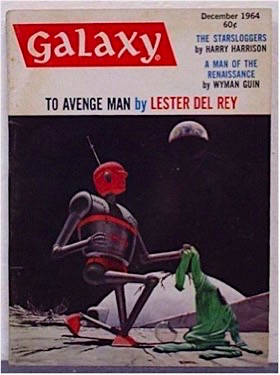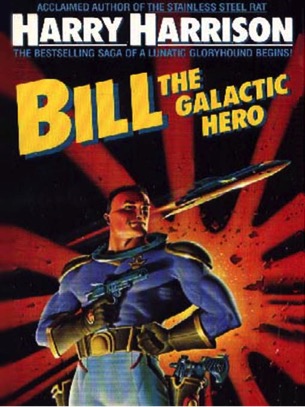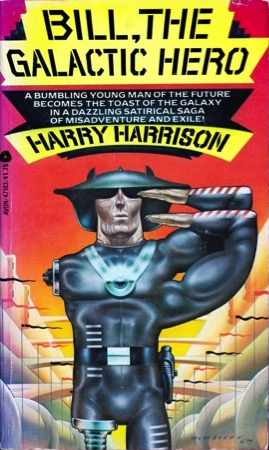In this monthly series reviewing classic science fiction books, Alan Brown will look at the front lines and frontiers of science fiction; books about soldiers and spacers, explorers and adventurers. Stories full of what Shakespeare used to refer to as “alarums and excursions”: battles, chases, clashes, and the stuff of excitement.
War is an ugly business. While many books focus on the gallantry and bravery, the triumph and victory, that certainly doesn’t represent all that war is. There is the dehumanizing nature of military service; becoming a cog in the machine. Not to mention the deprivation, pain, and suffering that one endures on the front lines. Anyone who has been in the military is familiar with gallows humor, and has seen people make jokes about things that under normal circumstances wouldn’t be funny. Human beings seem programmed to defiantly laugh at the worst life can throw at them, and the adventures of Bill, the Galactic Hero will certainly make you laugh.
Sometimes when I write these columns, I feel like the character, Colonel Freeleigh, in Ray Bradbury’s Dandelion Wine—the one the kids call the “Time Machine,” because his stories take them back to a different time. But I like to talk about my younger days, and looking at the time when a work was produced gives it a context. You can’t ignore the fact that Bill, the Galactic Hero was written in the early 1960s, at a time when U.S. involvement in the Vietnam War was growing rapidly, with the number of troops increasing significantly every year. The Gulf of Tonkin incident was used as a pretext by Congress to increase US involvement, even though participants in the decision-making process admitted that accounts of the incident had been inflated. The military focused heavily on questionable statistics, including enemy body counts, to measure the effectiveness of their actions. And as the military effort grew, so did an anti-war movement that was not willing to buy the argument being offered by the establishment. In fact, there are those who argue that the Viet Cong’s Tet Offensive in 1968 was not successful militarily, but succeeded instead in the court of public opinion, discrediting the establishment arguments and repudiating military claims of an enemy on the run. This was not the finest hour of the U.S. military.
During the 1960s, a period when U.S. society was polarized on many issues, I was exposed to different political viewpoints right in my own home. My father, a pocket protector-wearing aerospace engineer and Army Reserve officer, was a staunch Republican. My mother, who had seen the New Deal save her family farm, and bring electricity to her home, was a staunch Democrat. I saw that same split in the two science fiction magazines my dad subscribed to. Analog, edited by John W. Campbell, was deeply conservative, in some ways even reactionary in its political viewpoint. The worldview of Analog seemed to fit my father’s viewpoint to a T. Galaxy, on the other hand, was at the time edited by Frederik Pohl and presented a whole different world—focused less on hard science, more experimental, and featuring more humor and satire. The mere presence of Galaxy in the house told me that my father was not quite as rigid in his thinking as he appeared. And growing up with parents of opposing political opinions, and reading both of these magazines, I realized that there were different ways of viewing the world.
Harry Harrison, born in Connecticut in 1925, lived a broad and varied life. Like many of his generation, he did military service in World War II, serving in the Army Air Corps. He was a technician, working on bombsights and aiming devices, and also served as a military policeman. He developed a deep dislike for the military and bureaucracy during that service, a dislike that colored his work throughout his life. His start in genre fiction actually came in the world of comic books, as an illustrator and later a writer for EC comics and as a writer for the Flash Gordon newspaper strips. When the comic book industry fell on hard times in the ‘50s, however, he turned to science fiction writing. He was originally part of John Campbell’s stable of writers at Astounding Science Fiction. His first major work, the Deathworld trilogy, got its start in installments in Astounding. He also began his long series of stories about the con man James Bolivar DiGriz, known as “The Stainless Steel Rat,” a series that demonstrated his distrust of bureaucracies and governmental institutions. While he respected John Campbell, he chafed at the rigid restrictions placed on writers at Astounding, and his work began to appear elsewhere.
 It was in the December 1964 edition of Galaxy that I first encountered Bill in “The Starsloggers,” a “short novel” that was later expanded into the novel Bill, the Galactic Hero. The cover story of that issue, “To Avenge Man,” by Lester Del Rey, is another story that stuck with me because of its bleak premise—a bleakness that you wouldn’t have encountered in Analog. And there was a bleakness in “The Starsloggers,” as well as a mistrust of all things military, which I found quite different than anything I had encountered before.
It was in the December 1964 edition of Galaxy that I first encountered Bill in “The Starsloggers,” a “short novel” that was later expanded into the novel Bill, the Galactic Hero. The cover story of that issue, “To Avenge Man,” by Lester Del Rey, is another story that stuck with me because of its bleak premise—a bleakness that you wouldn’t have encountered in Analog. And there was a bleakness in “The Starsloggers,” as well as a mistrust of all things military, which I found quite different than anything I had encountered before.
The book Bill, the Galactic Hero begins with young Bill, an inhabitant of the backwater world of Phigerinadon II, in a very contented frame of mind. He is helping his mother by plowing the fields, and is happy to do so, but he also knows that he has a brighter future ahead once he completes his correspondence course for the position of Technical Fertilizer Operator. His fantasies about a local girl are interrupted, though, by the arrival of a recruiting sergeant. The red-coated sergeant uses tactics that were old when the British Army used them in the 19th Century, but augmented by the most modern psychological theories and mind-control devices. Soon Bill finds himself shipped off to boot camp, where he finds himself a victim of the purposeful cruelty of his drill instructor, Chief Petty Officer Deathwish Drang, a man so enamored of his vicious image that he has had fangs implanted to replace some of his teeth. The recruits are being trained to engage in total war with the Chingers, alien lizard-men whose very existence stands in the way of humanity’s imperial aims. The recruits are constantly reminded by lurid propaganda of the evil nature of the Chingers. Bill and the widely-varied recruits he serves with do their best to survive until they, and the entire staff of their camp, are sent off to the front lines.
Bill soon finds himself pressed into naval service, under the instruction of Fuse Tender Sixth Class Tembo, a kindly but eccentric religious man. Bill learns the brutal trade of fuse replacement, a mindless, dangerous, but necessary task during combat. He becomes aware of a suspicious member of the crew, and thwarts his efforts. When the ship is damaged in combat, and Tembo is killed, Bill finds himself stumbling into heroism, almost accidently destroying an enemy ship and turning the tide of the battle. He also loses his right arm in the battle, and finds that the surgeons, in their haste, have replaced it with the left arm of Tembo. (This causes some different interpretations in artistic renditions of Bill, some portraying him with the two arms both on the left side, with others showing the new left arm affixed to his right shoulder.)
Bill is then shipped off to the capitol planet to be decorated for bravery. He finds the reality of that planet-spanning city and its royalty somewhat less attractive than its reputation, and soon winds up lost, robbed, and accused of being a deserter. Whenever facts and bureaucracy clash, he notices that it is the bureaucracy that prevails. In his adventures moving ever down the ladder of society, he finds his original training as a fertilizer operator becoming unexpectedly useful, until finally he is captured and put on trial. Cleared from these charges, he bounces from the frying pan into the fire, sent to fight in the jungles of the planet Veneria, a planet whose jungles bear no small resemblance to the jungles of Vietnam. And in the end, Bill finds that his career has brought him full circle, though he’s now a very different person from the boy who contentedly plowed his mother’s fields.
A plot summary can’t possibly capture the absurdity and the humor of Bill’s adventures, nor can it capture the many jokes the reader will encounter along the way (and summarizing those jokes would tend to spoil them). Harrison’s version of faster-than-light travel, for example, is not only absurd in and of itself, it illustrates the absurdity of so many other methods described in science fiction. And through it all, his many observations on the true and dehumanizing nature of war are direct and to the point. Anyone who has served in the military will recognize example after example of things that echo their own service. If you weren’t laughing so much, the book could easily make you cry.
 Harry Harrison’s career in subsequent years was prolific and wide-ranging. In addition to appearing in Astounding/Analog and Galaxy, his short works appeared in Fantasy and Science Fiction, If and Vertex. His novel Make Room! Make Room! was later adapted into the movie Soylent Green. His books included further adventures of the Stainless Steel Rat, a prehistoric alternate history series that started with the novel West of Eden, an alternate history Civil War trilogy starting with Stars and Stripes Forever, and humorous novels like The Technicolor Time Machine, and A Transatlantic Tunnel, Hurrah! In the late 1980s and early 1990s, with the help of collaborators, Bill the Galactic Hero returned in a series of humorous novels. Harrison’s works were noted for their thoughtfulness, their humor, and his skill portraying action and adventure. Until his death in 2012, he was an influential presence in the science fiction community, and a staunch representative of its more liberal wing. One of my great regrets as a member of SF fandom is that, in all the conventions I attended, I never had the opportunity to meet him.
Harry Harrison’s career in subsequent years was prolific and wide-ranging. In addition to appearing in Astounding/Analog and Galaxy, his short works appeared in Fantasy and Science Fiction, If and Vertex. His novel Make Room! Make Room! was later adapted into the movie Soylent Green. His books included further adventures of the Stainless Steel Rat, a prehistoric alternate history series that started with the novel West of Eden, an alternate history Civil War trilogy starting with Stars and Stripes Forever, and humorous novels like The Technicolor Time Machine, and A Transatlantic Tunnel, Hurrah! In the late 1980s and early 1990s, with the help of collaborators, Bill the Galactic Hero returned in a series of humorous novels. Harrison’s works were noted for their thoughtfulness, their humor, and his skill portraying action and adventure. Until his death in 2012, he was an influential presence in the science fiction community, and a staunch representative of its more liberal wing. One of my great regrets as a member of SF fandom is that, in all the conventions I attended, I never had the opportunity to meet him.
What struck me about rereading Bill, the Galactic Hero for this column was how different it felt the second time around. When I first read it, it appeared as slapstick to me, rather dark in tone, but slapstick nonetheless. Reading it now, after long exposure to the military and with a better knowledge of history, I was struck by how much truth was mixed into the absurdity. The sometimes pointless campaigns, mindless bureaucracy, loss of individuality, wastefulness and suffering in warfare all resonated in a way that was lost on me in my youth. There are plenty of books that look at the adventure, bravery and glory of war. But we also need books like Bill, the Galactic Hero to remind us of the aspects of war that we might otherwise ignore. The humor makes it easy to read, but there is a strong dose of medicine mixed in with that sugar, medicine that we all need to remind us of the very real horrors of war.
Alan Brown has been a science fiction fan for five decades, especially science fiction that deals with military matters, exploration and adventure. He is also a retired reserve officer with a background in military history and strategy.










